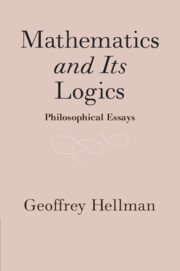Book contents
- Mathematics and Its Logics
- Mathematics and Its Logics
- Copyright page
- Contents
- Acknowledgements
- Introduction
- Part I Structuralism, Extendability, and Nominalism
- 1 Structuralism without Structures
- 2 What Is Categorical Structuralism?
- 3 On the Significance of the Burali-Forti Paradox
- 4 Extending the Iterative Conception of Set: A Height-Potentialist Perspective
- 5 On Nominalism
- 6 Maoist Mathematics?
- Part II Predicative Mathematics and Beyond
- Part III Logics of Mathematics
- Index
- References
2 - What Is Categorical Structuralism?
from Part I - Structuralism, Extendability, and Nominalism
Published online by Cambridge University Press: 26 January 2021
- Mathematics and Its Logics
- Mathematics and Its Logics
- Copyright page
- Contents
- Acknowledgements
- Introduction
- Part I Structuralism, Extendability, and Nominalism
- 1 Structuralism without Structures
- 2 What Is Categorical Structuralism?
- 3 On the Significance of the Burali-Forti Paradox
- 4 Extending the Iterative Conception of Set: A Height-Potentialist Perspective
- 5 On Nominalism
- 6 Maoist Mathematics?
- Part II Predicative Mathematics and Beyond
- Part III Logics of Mathematics
- Index
- References
Summary
In a recent paper Hellman [2003], we examined to what extent category theory (CT) provides an autonomous framework for mathematical structuralism. The upshot of that investigation was that, as it stands, while CT provides many valuable insights into mathematical structure – specific structures and structure in general – it does not sufficiently address certain key questions of logic and ontology that, in our view, any structuralist framework needs to address. On the positive side, however, a theory of large domains was sketched as a way of supplying answers to those key questions, answers intended to be friendly to CT both in demonstrating its autonomy vis-à-vis set theory and in preserving its “arrows only” methods of describing and interrelating structures and the insights that those methods provide.
- Type
- Chapter
- Information
- Mathematics and Its LogicsPhilosophical Essays, pp. 43 - 53Publisher: Cambridge University PressPrint publication year: 2021
References
- 1
- Cited by



